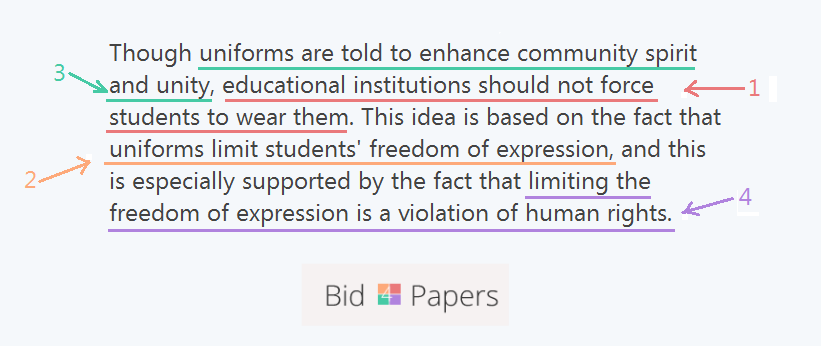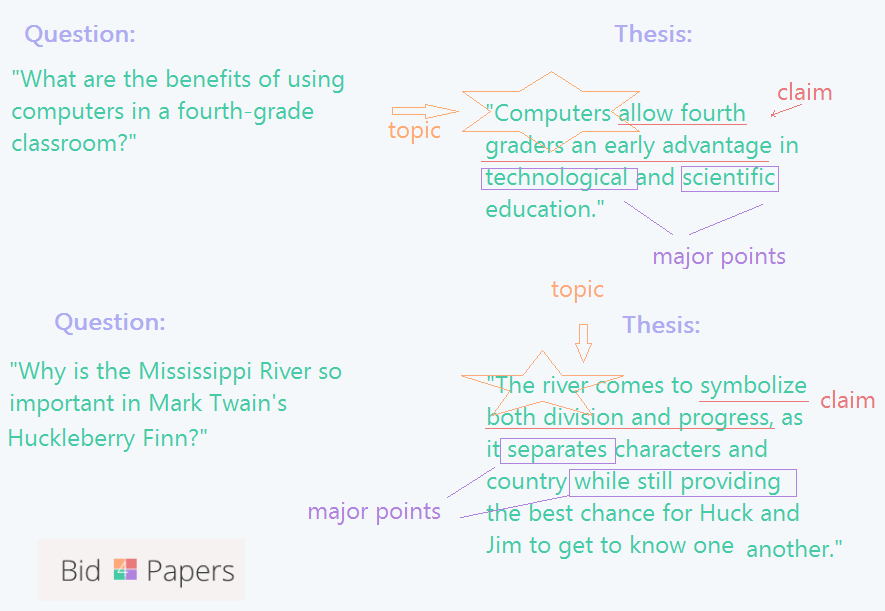
How to Write a Strong Thesis Statement

Bad news about thesis statement goes first:
You won’t get an A for an essay if it doesn’t have a thesis statement. It is one of the first things your teacher looks for and one of the main factors for your grade.
And this is where most students run into trouble:
- “What does it mean to write a compelling thesis statement?”
- “Where should I put it?”
- “What is its structure?”
- “How should I write it, after all?”
Take it easy! Good news is on its way:
This article is here to explain everything in plain English and share actionable tips with you on how to write strong thesis statements for your academic papers.
Here we go.
So, what is a thesis statement?
Definition of thesis is simple:
It’s a sentence or two at the end of the introduction to your paper that explains a central claim you’ll discuss and prove in each of the following paragraphs.
Attention, please!
Do not confuse thesis statements with introductions, as most students asking how to start an essay do! An essay thesis closes your introduction rather than substitutes it. Hook readers first, then introduce your topic, and only then state a thesis.

- A hook. Write a strong opening sentence capturing readers’ attention.
- A topic. Tell readers about the focus of your informative essay.
- A thesis. State your opinion on the topic.
In other words, it’s the heart of your essay. It explains to the reader what your paper will be about.
Why write a thesis statement
First, a strong thesis statement influences your teacher’s feedback on your essay and your final grade for it.
Second, it makes a paper logical and focused, simplifying the writing process for you: once you figure out the main idea for yourself and express it in a clear, brief, and intelligible thesis statement, all the following paragraphs of your paper will be based on it.
As a result, you won’t be distracted by your reasoning and therefore avoid the risk of turning your essay into gibberish full of weak arguments.
And third, it summarizes your topic and declares your position on it. You need a strong thesis statement for the audience to understand if your paper is something they want to read.
The elements of a thesis statement
An essay thesis consists of four elements:
- The main idea of your paper in a simple sentence.
- A reason why you support this idea.
- A counterargument to your claim, if there is one.
- A valid piece of information that supports your position.
When you have all the four points, you should organize them in a coherent sentence or two using transitions and linking words.
Here is an example of a thesis statement with all the necessary elements:

How to know your statement is strong
- It’s brief and informative.
- It presents a clear argument with your opinion on the issue or a side of the issue you’ll support.
- It has a logical basis. Even if sharing your personal opinion, make sure to back it up with logic or facts.
In other words, your thesis should identify the topic, the claim, and the major points you’ll use in an essay to support the claim.
Thesis statement examples (1):
“Stress in the fast-food workplace has led to serious physical, psychological, and emotional problems for employees.”
Topic: stress in the fast-food workplace
Claim: led to serious problems
Major points: physical problems, psychological problems, emotional problems
Thesis statement examples (2):
“Advertisers target young people when marketing cigarettes, alcohol, and adult movies.”
Topic: aggressive advertising
Claim: wrong targetting young people
Major points: cigarettes, alcohol, and adult movies
Attention, please!
A thesis is an interpretation of a subject, not the subject itself. Also, choose a claim that others might dispute. It should be specific and express one main idea.

Further reading: How to Tell a Strong Thesis Statement from a Weak One
How to Generate a Thesis Statement if the Topic is not Assigned
In this case, the example of a thesis statement will look more difficult because you were not given a prompt. In this case, you must find the issue you want to write a paper about. Most often, it is possible to distinguish four features of such a thesis statement:
- it is necessary to use only one thought in it;
- the topic should not be one-sided so that there are arguments against it;
- must apply to the subject of your research paper, i.e., understandable;
- should create conclusions on the taken subject of the scientific material.
This lets you quickly write a thesis without additional problems and pass it on to the teacher.
Here is a simple example:
- A common theme is the problem with food, habits, and obesity.
- You can talk about the amount of sugar consumed and what it leads to.
- Next, you compress the topic further to sugar problems in children in junior high school.
- After that, you take one of the positions. Either it is valid, or it is not.
- Write an essay based on your position and look for appropriate statements.
After that, you can ask yourself a question in the standard way and compose a successful thesis statement. As you delve deeper into the topic, you will find it easier and easier to come up with an appropriate question to answer. For example, it might now be, “What can be done to reduce the amount of sugar children consume at school?”. The answer will be your thesis statement. You can then develop your position as you write your research paper.
How to Generate a Thesis Statement if the Topic is Assigned
Such academic thesis statement examples are much simpler than the previous ones because the topic helps to create a quality statement at the beginning of the research paper. In this case, your first step will be to ask yourself a question. For example, if the topic looks like “How computers can change education in elementary school,” you can ask, “What benefits will children gain from having computers in the classroom?”.
By doing this, you get an actual thesis statement for the essay. Just answer the question, and you will have, “Computers will allow children in the classroom to do this and learn this.” This statement will be your thesis statement, which you can further develop through argumentation and facts.

Do ALL essay types need a thesis statement?
Hope is the last to die, right?
Sorry to disappoint you but yes, a thesis statement is a fundamental element of nearly any type of paper, apart from, possibly, creative writing.
However, it may look different depending on the type of paper.
- If you are writing a review or a response, your thesis must contain your opinion of the piece you are reviewing, based on the elements of a film, article, or book and the way they impacted you as the audience.
- If you are writing a literary or business analysis, your thesis statement must reflect your main finding and the method you applied to reach it.
- If it is a compare and contrast essay, you should point out the similarities and differences of the works discussed in your thesis statement and develop the details in the body of your paper.
- If it is a personal narrative or reflection, your thesis statement should contain the main idea you have learned and what you want to share.
When you write it wrong, and how to change that
The most common mistake that undermines the strength of a thesis statement in the essay is making a descriptive thesis instead of an argumentative one.
Descriptive is a statement that simply names the topic but doesn’t present any claim and major points.
Example:
Let’s say you write an essay about the relevance of uniforms at schools.
Your descriptive thesis statement would be:
“This paper will discuss whether students have to wear school uniforms because this issue has two sides and the arguments on both are compelling.”
Your argumentative thesis statement may be as follows:
“Though uniforms are told to enhance community spirit and unity, educational institutions should not force students to wear them. This idea is based on the fact that uniforms limit students’ freedom of expression, and this is especially supported by the fact that limiting the freedom of expression is a violation of human rights.”
Why the descriptive one doesn’t work? Because it simply duplicates the title of your paper and does not enlighten on the work you are supposed to do as a student.
So here go some tips for you to write strong thesis statements:
- Brainstorm your topic: take a sheet of paper and write down everything that comes to your mind on it.
- Limit it to a specific area.
- Make it a question and (surprise-surprise!) answer it. Ta da! The answer is exactly what your thesis statement will be.
Now, everything you need to do is tailor your statement to the type of paper you are assigned to write and limit it to one or two sentences in length.
Example:

To ease the process, you can try online thesis statement generator: write your topic, claim, and major points there – and get your thesis statement, strong and ready to rock the world.
It’s not only a marker of good academic writing but also an aid for the logic of your writing. A strong thesis statement should exactly communicate what you want to tell in your paper and be as concise as possible. This can be especially helpful when using an essay maker to help craft an effective essay.